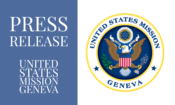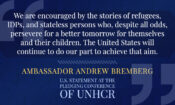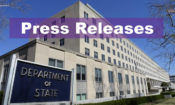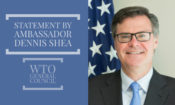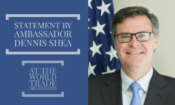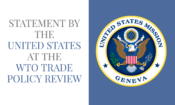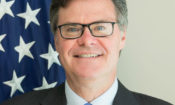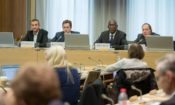United Nations First Committee
(Disarmament and International Security)
General Debate Speech
Ambassador Robert Wood
U.S. Permanent Representative to the Conference on Disarmament, U.S. Special Representative for Biological and Toxin Weapons Convention (BWC) Issues and U.S. Commissioner for the New START Treaty’s Bilateral Consultative Commission (BCC)
October 9, 2020
Text of Video Statement
Thank you, Mr. Chairman.
On behalf of the United States Delegation, I congratulate you on your election as Chair of the First Committee. We also congratulate the other members of the Bureau for their elections, and commit to working with each of you toward a successful session.
As much as we all wish we could operate in the 75th session as we did before COVID-19, the plague unleashed onto the world by the People’s Republic of China, has forced us to adjust. As President Trump said in his speech to the General Assembly last month, “In the earliest days of the virus, China locked down travel domestically while allowing flights to leave China — and infect the world,” for which it must be held to account.
The UN and the diplomatic community resident here in the City of New York have been forced to consider creative and innovative ways to operate while attempting to respond effectively to 21st century threats to international peace and security. We commend our fellow delegates and the Secretariat for their flexibility and resilience during these unprecedented times. We express our deepest sympathies for people everywhere impacted by COVID-19.
Regarding the First Committee’s mandate to address disarmament and international security issues, China is undergoing a crash nuclear weapons build-up completely unconstrained by any arms control limits, with potentially deadlier consequences for the world than COVID-19 – all the while refusing to engage in constructive dialogue. For far too long, China has pretended to be a hero of multilateralism, supposedly deserving a “free pass” in the First Committee from international scrutiny of its irresponsible and aggressive nuclear arms build-up. Mr. Chairman, those days are over.
Mr. Chairman, Russia has long used the UN and other multilateral bodies to launder its bad international behavior. This is especially discouraging, given that the Soviet Union arguably suffered more than any other nation during the Second World War, the “Great Patriotic War”, which gave rise to the UN Charter and this institution in the hope of preventing States from employing brute force as their policy choice of first resort. Not so with Russia, it seems. Ask Russia’s neighbors for details. In outer space, Russia has twice in recent years tested space-based weapons while at the same time claiming it seeks to prevent the weaponization of space through both legally binding arms control and through its No First Placement resolution in this body. International security is put at risk by failing to challenge Russia’s serial noncompliance with its arms control obligations and commitments.
In addition to developing and deploying nuclear weapons that are unconstrained by the New START Treaty, such as exotic nuclear delivery systems and new nonstrategic nuclear weapons, which runs counter to the goal of disarmament, Russia continues to undermine the international security frameworks to which it has agreed. It is a serial violator of its arms control, disarmament, nonproliferation, and European security obligations and commitments. As the United States has documented in our annual compliance reports, Russia has failed to comply with its obligations under not only the now-defunct Intermediate-Range Nuclear Forces Treaty, but also the Treaty on Open Skies, the Treaty on Conventional Armed Forces in Europe, and the Chemical Weapons Convention, in addition to undertaking activities that raise concerns about its compliance with the nuclear weapons Threshold Test Ban Treaty.
Secretary Pompeo has condemned Russia’s aggressive and destabilizing behavior in Europe, the Middle East, and around the world. This week, Germany made public the Organization for the Prohibition of Chemical Weapons Technical Assistance Visit report confirming Aleksei Navalny was poisoned by a nerve agent of the Novichok group. The United States has full confidence in the OPCW’s findings, which now have independently confirmed the chemical analysis from German, French and Swedish certified laboratories. The United States and our allies and partners have agreed that the Russian Government must provide a full accounting for the poisoning of Alexei Navalny; and reiterate that any use of chemical weapons, anywhere, at any time, by anyone, under any circumstances is unacceptable and contravenes the very international norms and standards that all responsible nations seek to uphold and defend.
Further, we call on Russia, who now has requested OPCW assistance to be completely transparent regarding such events; and cooperate fully with the Organization without delay, obfuscation and misinformation from the facts. The poisoning of Alexsei Navalny was a deliberate heinous act – tragically one we have seen before with the attempted assassination of Sergey and Yulia Skripal in Salisbury, UK, in March 2018. While Russia conveniently has requested assistance; it is nearly indefensible to argue that anyone else other than Russia could have taken this action against Mr. Navalny. We condemn such actions; and call on Russia to fulfill its obligations under the Chemical Weapons Convention by completely declaring and destroying its chemical weapons program under international verification.
There can be no impunity for the use of chemical weapons. This is critical not only for the viability of our arms control and nonproliferation framework but for international security more generally.
Regarding the New START Treaty, we continue to engage bi-laterally on the way forward on an agreement that addresses all nuclear warheads. While the New START Treaty limits strategic ranged warheads and delivery systems it does nothing to address the thousands of battlefield and theatre ranged systems where Russia continues to build, develop and field nuclear weapons. This dangerous and growing stockpile must be addressed by the members of this body.
While the United States has certified Russia’s compliance with New START to the U.S. Congress every year since entry into force, Russia has during this same period invested heavily in novel nuclear delivery systems and nuclear weapons that are not constrained by New START. An arms control treaty that Russia complies with, but which allows it to work to gain competitive military advantage undercuts the fundamental purpose of the agreement. Such deficiencies need to be addressed.
Mr. Chairman, the United States has made concerted efforts over the years to reduce the role of nuclear weapons in international affairs and to negotiate reductions in the number of nuclear weapons. In this regard, we commemorate the 50th anniversary of the Nuclear Non-Proliferation Treaty’s entry into force and we look forward to the Review Conference, unfortunately postponed by COVID-19. Negotiated during the height of the Cold War, the NPT remains the cornerstone of international efforts to prevent the spread of nuclear weapons. The Treaty also remains essential to promoting the peaceful uses of nuclear energy for human health and development. Moreover the NPT’s Article VI makes clear that each NPT Party has an obligation “to pursue negotiations in good faith on effective measures relating to cessation of the nuclear arms race at an early date and to nuclear disarmament, and on a treaty on general and complete disarmament under strict and effective international control.”
The United States has for some time called for a new era of arms control. Why a new era? The reason is clear: The bilateral Cold-War approach to arms control that only constrains the United States and the Russian Federation, while important, is no longer sufficient to address current geopolitical security challenges. A new era must begin with cooperation among the three largest nuclear powers on earth, to build a strong foundation for a future treaty that addresses all nuclear weapons and is rigorously verifiable. Such a treaty is essential to that goal we seek of a world without nuclear weapons.
Without such a treaty, our generation is facing the menacing prospect of a new nuclear arms race among the three largest nuclear powers in the present era, triggered by the continuing actions of China and Russia. With Beijing’s overall number of nuclear warheads in its current stockpile, its ever-larger and more sophisticated delivery systems, and its plans to more than double the number of warheads it possesses in this decade, China has indeed emerged as the third largest nuclear power on earth, completely unconstrained by any nuclear arms control agreement. And similar to China, the Russian Federation is engaged in a massive expansion of its nuclear capabilities and the introduction of new exotic delivery systems that also threaten to ignite a new – trilateral – nuclear arms race.
In stark contrast, while the United States has invested in life extension programs and other sustainment activities, we have yet to take the strategic decision to match ongoing Russian and Chinese nuclear build-ups. Instead, and because we value peace, predictability, and stability, we have continued to sound the alarm about this potentially destabilizing development for international security, and come before you today to seek your assistance in addressing it. If we do not get that assistance we will have to take, unilaterally or in concert with allies, whatever steps are necessary to protect our national security interests.
Mr. Chairman, preventing a trilateral nuclear arms race among the three largest nuclear powers represents a central war and peace issue of our time. Should such a race begin, its scale and intensity could very likely dwarf the bilateral arms race of the Cold War – with potentially dangerous consequences for the peace and security of the entire world. Fortunately, such a trilateral arms race is entirely avoidable.
Every UN Member State, every member of this Committee, has a right, a responsibility, and an existential interest to be heard on this issue. Our three nations should be openly called upon to engage one another on trilateral arms control and lead the way for the eventual elimination of all nuclear weapons. The United States, the Russian Federation, and China need only to embrace a responsible course and take nuclear arms control to the next level without further delay. For its part, the United States stands ready. We must prevent a new arms race and avoid conflict, which is in the interests of all nations. An historic negotiating table is waiting, and it has three chairs around it. It is time for Washington, Moscow, and Beijing to sit down with one another, engage in good faith, and reduce nuclear risks rather than heighten them.
Mr. Chairman, thank you for your kind attention.


